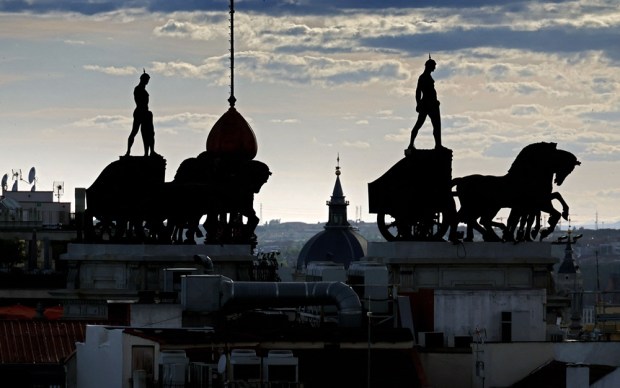Here at The Spectator Australia, we work tirelessly to keep you up to date on developments concerning the great institutions that make up the bulwark of our civilisation. The three I have in mind this week are democracy, the rules-based order and the media.
On democracy, it is good to see this noble principle flourishing: only a few days ago, that renowned statesman Bashar al-Assad, was sworn in for a fourth term as President of Syria. You will recall that we saved his skin by joining with the US and blasting ISIL’s terrorists into paradise. I must confess I did not know the election had taken place, but the good people of Syria did, because they gave him 95 per cent of the vote. But right on cue, some mean-spirited critics who never stop carping about Syria, asked in a cynical tone how the Syrian people could vote when most of them were either dead, in prison or in refugee camps. Whatever they say, the election was a great success: 10 million people cast their votes, said by the usual critics to be only 5 million, but in any event 13 million of them voted for Mr Assad. It was also untrue to suggest that Assad had no opposition because of the wholesale rejection of presidential candidates by the Constitutional Court. But the totally independent court banned only five upstarts who were entirely unsuited to presidential office, leaving two viable opponents of the President, even if one of them had been expelled from his own party in advance and the other garnered only 1.5 per cent of the vote, consisting mostly of his wives. What’s more, cleansing the nominations of rival candidates was a great service to the electorate: we know from the Australian experience the burden on the voter when too many candidates clog up a ballot paper. Moreover, the government provided ballot papers in government-controlled regions of the country, had its polling officials fill in the ballots of voters who needed help in voting and generally contributed to a happy, festive air by decorating the polling stations with banners and photographs of the President. So, democracy is alive and well in Syria. But even there, we must admit it is under challenge from democratic rivals; the 95 per cent won by Assad is less than the last election in Kazakhstan where the president came in with 97.8 per cent, no doubt because, on international comparisons, its students are so much better than ours at mathematics. True, the 2020 Belarusian presidential election saw President Lukashenko slip to a worrying 80 per cent of the vote; but in any country, 20 per cent of the population are recalcitrant malcontents. Syria itself is also under challenge from the Central African Republic who have introduced the most significant international democratic reform since the 1832 Reform Bill, namely counting the result before the votes have been cast, which leads to a quicker result and more accurately reflects the true intention of the voter. But our Syrian correspondent tells us this reform is now under active consideration in Damascus.
The second bulwark of our civilisation that deserves praise is the rules-based order and its cousin the international rules-based order. This noble rubric says that everyone must obey the law and not use force or dishonesty to get their way. New evidence of the importance of this institution pops up every day. The most recent example is the courageous and responsible decision by the Commonwealth not to prosecute anyone for AMP’s charging its customers for advice that was never given, engaging in general deviousness and misleading the corporate regulator, which the then treasurer, Scott Morrison rightly said, deserved ‘jail time’. It would have been very easy to prosecute them, but the harder and more responsible decision was to apply the age-old maxim of law enforcement that it is better for 100 guilty men to walk free, than prosecuting everyone involved and obtaining a mere 50 convictions. It is the same internationally. There are now some great examples of the workings of the rules-based order that make for a more stable and predictable world. China can rampage around the Pacific, building military bases as if it were a Lego game, beating up their own citizens in Hong Kong, terrorising Taiwan, locking up Uighurs in concentration camps and destroying our exports. In Myanmar, the government shoots anyone in sight, even if they are entirely innocent. Russia can invade Ukraine, shoot down civilian aircraft, poison Putin’s rivals and keep the population under a tsarist reign of terror. If you go to a Saudi consulate to collect your passport, you might be carved up and dumped in a plastic rubbish bag. In any of the tinpot, hell-hole countries in South America, you will have no rights, no prospects and no food. In Africa, you will be grateful if your ruler does not eat you before you can get on a dinghy and sail to Italy. And what will happen to the cavalcade of statesmen who perpetrate these horrors? Nothing, except receiving a UN prize for human rights.
But with my third issue, the media, things are not so good. Last week, I stopped buying the Age, after 50 years. It is now a capitalist lickspittle with up to 20 pages of advertisements for washing machines, household goods and bed-spreads, a slap in the eye to all women because the Age thinks they are only interested in the kitchen, the laundry and the bedroom. Worse, it has sacked Amanda Vanstone because she is a woman. Presumably, they think they atoned for this when the SMH sacked John Hewson because he is a man. I also made the mistake of watching the ABC’s once great Insiders which has continued its downward spiral into oblivion. They should name it The David Speers Hour; it is just a series of speeches and interruptions by Speers himself. I no longer wonder why politicians go on the program; I now wonder why journalists go on it.
Got something to add? Join the discussion and comment below.
Get 10 issues for just $10
Subscribe to The Spectator Australia today for the next 10 magazine issues, plus full online access, for just $10.
You might disagree with half of it, but you’ll enjoy reading all of it. Try your first month for free, then just $2 a week for the remainder of your first year.















Comments
Don't miss out
Join the conversation with other Spectator Australia readers. Subscribe to leave a comment.
SUBSCRIBEAlready a subscriber? Log in